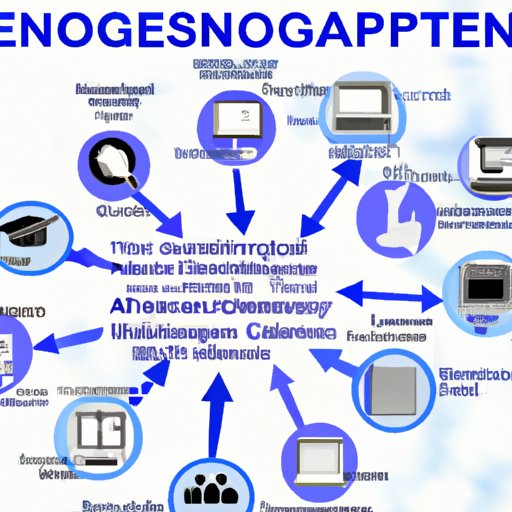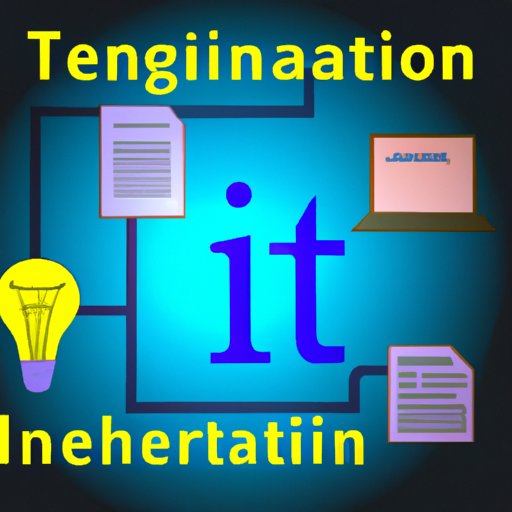Introduction
Information technology (IT) is a rapidly evolving field that encompasses everything from computer hardware and software to telecommunications and data networks. As a result, IT professionals have many different educational options available to them, ranging from short-term certification programs to full undergraduate and graduate degrees. In this article, we’ll explore the different types of IT education and what courses are offered in each type.

Exploring Information Technology Courses: A Comprehensive Overview
When it comes to IT education, there are two main categories: degrees and certificates. Degrees can range from associate’s or bachelor’s degrees in IT to master’s and doctoral degrees. Certificates, on the other hand, are generally shorter-term programs focused on specific skills and technologies. Let’s take a closer look at each type of IT education.
Different Types of Degrees and Certificates in IT
Degrees in IT are typically divided into two categories: undergraduate and graduate. Undergraduate degrees include associate’s and bachelor’s degrees. Associate’s degrees are generally two-year programs and provide a broad overview of IT topics. Bachelor’s degrees are more in-depth and may require four years of study. Graduate degrees include master’s and doctoral degrees in IT, which provide advanced knowledge and skills for the professional level.
Certificates are shorter-term programs focused on specific skills and technologies. They generally require less time to complete than a degree program and can provide valuable credentials for IT professionals. Common types of IT certificates include network security, software development, database administration, and computer programming.
An Introduction to Popular Information Technology Courses
IT degrees and certificates cover a wide variety of topics, including computer networks, operating systems, programming languages, database management, web development, and software engineering. Depending on the program, courses may also cover topics such as cybersecurity, artificial intelligence, and cloud computing. Here are some examples of popular IT courses:
- Computer Networks: Students learn about network architecture, protocols, and security.
- Operating Systems: Students learn how to install, configure, and maintain operating systems.
- Programming Languages: Students learn how to write code using popular programming languages.
- Database Administration: Students learn how to design, implement, and manage databases.
- Web Development: Students learn how to create websites using HTML, CSS, JavaScript, and other tools.
- Software Engineering: Students learn how to develop software applications using industry-standard methods and tools.
These are just a few of the courses offered in IT programs. Depending on the program, students may have the opportunity to take additional courses related to their particular interests.
Choosing the Right Information Technology Course
When choosing an IT course, it’s important to understand the basics of each type of program. Degrees and certificates may have different requirements and offer different levels of expertise. For example, a bachelor’s degree in IT will provide a more comprehensive understanding of the field than a certificate program. Similarly, a master’s degree in IT will provide more advanced knowledge than a bachelor’s degree.
It’s also important to consider the potential benefits of pursuing an IT education. According to a survey conducted by the Computing Technology Industry Association, “IT certifications can lead to higher salaries, increased job satisfaction, and better job opportunities.” Moreover, an IT degree or certificate can help you stand out in the job market and make you more competitive for roles that require technical knowledge and skills.
Finally, IT professionals can use their education to advance their career. Many employers offer tuition reimbursement or other incentives for employees who pursue IT education. Additionally, IT professionals can use their education to move into leadership positions or explore new career paths within the field.
Conclusion
Information technology is a rapidly growing field with a variety of educational options available. Degrees and certificates can provide a comprehensive understanding of the field, while specialized training can help IT professionals hone their skills and stay up-to-date with the latest technologies. By understanding the basics of IT courses and the career-advancing benefits of pursuing an IT education, individuals can make informed decisions about their IT education.
(Note: Is this article not meeting your expectations? Do you have knowledge or insights to share? Unlock new opportunities and expand your reach by joining our authors team. Click Registration to join us and share your expertise with our readers.)
